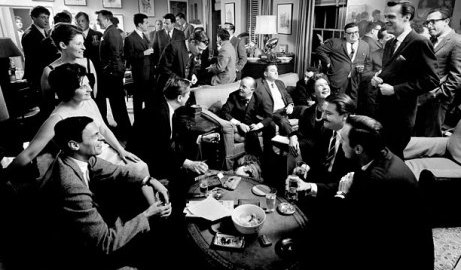The iPad Needs Norman Mailer, and The Paris Review

News of Norman Mailer via his widow’s memoir makes us want to remember all the things he wrote—and said. Like this: “A novel, at its best, really is an imaginary construction . . . that occasionally is written well enough so that it exists in people’s minds . . . as something they can use . . . Madame Bovary is of immense value to any married woman who is unhappily married and contemplating an affair.” You can access complete audio of this interview here thanks to The Paris Review, a publication whose history—and deep relevance to literary culture—reminds us why we need writers in our lives. When Apple staffs editors to create cool literary apps, this is the place they should start.
Mailer was part of the unique family of authors and editors corralled over time by the iconic Review. Their website is a candy store, and it includes the complete DNA of Literature/Paris ReviewInterviews Archive. Select any excerpt; they’re all brilliant. Here is part of the latest to arrive online, in which Chinese writer Ha Jin addresses the differences between English and Chinese:
English has more flexibility. It’s a very plastic, very shapeable, very expressive language. In that sense it feels quite natural. The Chinese language is less natural. Written Chinese is not supposed to represent natural speech, and there are many different spoken dialects that correspond to the single written language. The written word will be the same in all dialects, but in speech it is a hundred different words. The written language is like Latin in that sense; it doesn’t have a natural rhythm. The way people talk—you can’t represent that. The accents and the nongrammatical units, you can’t do it. You can’t write in dialect, like you can in English, using a character to represent a certain sound, because each character has a fixed meaning.
When the first emperor wanted to unify the country, one of the major policies was to create one system of written signs. By force, brutal force, he eliminated all the other scripts. One script became the official script. All the others were banned. And those who used other scripts were punished severely. And then the meanings of all the characters, over the centuries, had to be kept uniform as a part of the political apparatus. So from the very beginning the written word was a powerful political tool.
The real revolution in literary publishing begins once Apple captures the experience of connecting with minds like these, to produce a truly new “system of written signs.” It will not be simply, for example, Ulysses-for-the-screen but rather the application of a Joycean mind to a new kind of story. Products coupling sexy technology with novelistic “imagination” will retain their utility (Flaubert and the housewives); they will also be powerful pieces of art.




